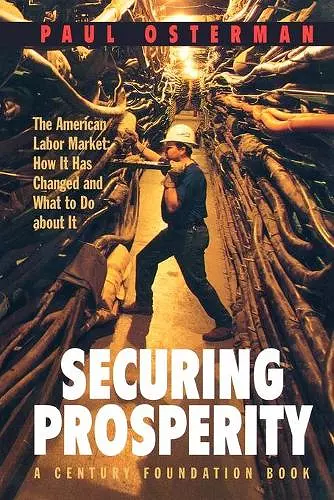Securing Prosperity
The American Labor Market: How It Has Changed and What to Do about It
Format:Paperback
Publisher:Princeton University Press
Published:26th Feb '01
Should be back in stock very soon

Securing Prosperity is a balanced, comprehensive, and shrewd analysis of the changes that have buffeted the U.S. workplace over the past twenty years. Paul Osterman focuses on the huge rise in labor-market mobility and the shifting balance of power between employees and management, showing both the positive and negative sides of these developments. The book includes sensible policy recommendations to help ensure greater equity and efficiency in the labor market. This is applied scholarship at its best. -- Sanford M. Jacoby, Management and Policy Studies, UCLA This is the ideal book for anyone interested in how globalization and the new market economy have altered the lives of employees and what corrective measures might be taken to cushion the harmful effects without sacrificing the benefits. A balanced, highly informative account by an acknowledged expert in the field. -- Derek Bok, John F. Kennedy School of Government, Harvard University An intelligent, balanced, illuminating account of the challenges posed by the emerging labor market of the global information economy. Paul Osterman provides persuasive examples of innovative work systems and new community institutions that can satisfy both employers who need flexibility and employees who want security. The national policy debate will be enriched by Osterman's call for political vision to diminish the risks of job mobility without undermining it. -- Rosabeth Moss Kanter, Harvard Business School, author of "World Class" and "Rosabeth Moss Kanter on the Frontiers of Management" This book is an important contribution both to policy discussions and to academic research on the contemporary American labor market... Osterman writes simply and clearly. -- Bruce Western, Princeton University
We live in an age of economic paradox. The dynamism of America's economy is astounding - the country's industries are the most productive in the world and spin off new products and ideas at a bewildering pace. Yet Americans feel deeply uneasy about their economic future. This work explains why these changes have occurred.We live in an age of economic paradox. The dynamism of America's economy is astounding--the country's industries are the most productive in the world and spin off new products and ideas at a bewildering pace. Yet Americans feel deeply uneasy about their economic future. The reason, Paul Osterman explains, is that our recent prosperity is built on the ruins of the once reassuring postwar labor market. Workers can no longer expect stable, full-time jobs and steadily rising incomes. Instead, they face stagnant wages, layoffs, rising inequality, and the increased likelihood of merely temporary work. In Securing Prosperity, Osterman explains in clear, accessible terms why these changes have occurred and lays out an innovative plan for new economic institutions that promises a more secure future. Osterman begins by sketching the rise and fall of the postwar labor market, showing that firms have been the driving force behind recent change. He draws on original surveys of nearly 1,000 corporations to demonstrate that firms have reorganized and downsized not just for the obvious reasons--technological advances and shifts in capital markets--but also to take advantage of new, team-oriented ways of working. We can't turn the clock back, Osterman writes, since that would strip firms of the ability to compete. But he also argues that we should not simply give ourselves up to the mercies of the market. Osterman argues that new policies must engage on two fronts: addressing both higher rates of mobility in the labor market and a major shift in the balance of power against employees. To deal with greater mobility, Osterman argues for portable benefits, a stronger Unemployment Insurance system, and new labor market intermediaries to help workers navigate the labor market. To redress the imbalance of power, Osterman assesses the possibilities of reforming corporate governance but concludes the best approach is to promote "countervailing power" through innovative unions and creative strategies for organizing employee voice in communities. Osterman gives life to these arguments with numerous examples of promising institutional experiments.
"Drawing on new surveys of nearly 1000 corporations, Osterman reaches some interesting conclusions... [His] policy recommendations are thoughtful."--Jim Holt, Management Review
ISBN: 9780691086880
Dimensions: unknown
Weight: 340g
240 pages